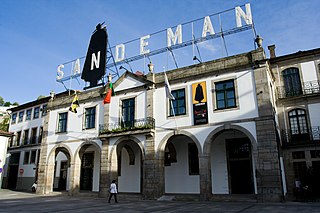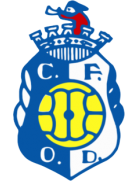
The Douro is the highest-flow river of the Iberian Peninsula. It rises near Duruelo de la Sierra in the Spanish province of Soria, meanders south briefly then flows generally west through the northern part of the Meseta Central in Castile and León into northern Portugal. Its most plentiful tributary is the right-bank Esla river. At Douro's mouth at Porto, the second largest city of Portugal, the river meets the Atlantic Ocean.

Porto or Oporto is the second-largest city in Portugal, the capital of the Oporto District, and one of the Iberian Peninsula's major urban areas. Oporto city proper, which is the entire municipality of Porto, is small compared to its metropolitan area, with an estimated population of just 231,800 people in a municipality with only 41.42 km2. Porto's metropolitan area has around 1.7 million people (2021) in an area of 2,395 km2 (925 sq mi), making it the second-largest urban area in Portugal. It is recognized as a global city with a Gamma + rating from the Globalization and World Cities Research Network. The city is home to one of Portugal's most successful and popular football clubs, F.C. Porto.

Vila Nova de Gaia, or simply Gaia, is a city and a municipality in Porto District in Norte Region, Portugal. It is located south of the city of Porto on the other side of the Douro River. The city proper had a population of 178,255 in 2001. The municipality has an area of 168.46 km². and a total population of 302,295 inhabitants (2011), making it the most populous municipality in Norte Region. Gaia along with Porto and 12 other municipalities make up the commonly designated Porto Metropolitan Area.

Lamego is a city and municipality in the Viseu District, in the Norte Region of the Douro in northern Portugal. Located on the shores of the Balsemão River, the municipality has a population of 26,691, in an area of 165.42 km2.

Manoel Cândido Pinto de Oliveira was a Portuguese film director and screenwriter born in Cedofeita, Porto. He first began making films in 1927, when he and some friends attempted to make a film about World War I. In 1931 he completed his first film Douro, Faina Fluvial, a documentary about his home city Porto made in the city-symphony genre. He made his feature film debut in 1942 with Aniki-Bóbó and continued to make shorts and documentaries for the next 30 years, gaining a minimal amount of recognition without being considered a major world film director.
Oliveira do Douro may refer to the following places in Portugal:

João Domingos da Silva Pinto is a Portuguese former footballer and manager. Having spent his entire professional career with Porto, he is regarded as one of the greatest Portuguese right-backs of all-time.
Lactogal is a Portuguese food products company focused on dairy products, milk, fruit juice and mineral water. It is headquartered in Porto and is placed among the twenty largest agro-food European companies. It has major factories in Oliveira de Azeméis and Vila do Conde.

Cinfães is a village and a municipality in the northern district of Viseu, Portugal. The village proper has about 3,300 inhabitants. The population of the municipality in 2011 was 20,427, in an area of 239.29 km2.

Mesão Frio is a municipality in the district of Vila Real in Portugal. The population in 2011 was 4,433, in an area of 26.65 km².
José Fernando Gomes Tavares is a Portuguese former footballer who played mainly as a central midfielder. He is currently the head coach of Crown Legacy FC in MLS Next Pro.

Avintes is a Portuguese civil parish in the municipality of Vila Nova de Gaia. The population in 2021 was 10,838, in an area of 8.82 km2. It is known in Portugal as "Terra da Broa", meaning "Land of the Broa", referring to the Broa de Avintes, a typical farmhouse bread widely consumed in Northern Portugal, which originated in Avintes.

Beira Litoral is a former province (província) of Portugal, formally instituted in an administrative reform of 1936. It was abolished with the 1976 Constitution of Portugal.
The 2009–10 Taça de Portugal was the 70th season of the Taça de Portugal. The competition began on 30 August 2009, with the first round matches, and concluded with the final, held on 16 May at the Estádio Nacional, in Oeiras, between defending champions Porto and then Liga de Honra team Chaves. Porto won 2–1 to take their second consecutive cup, and assuring a place in play-off round of the 2010–11 UEFA Europa League.

The term "provinces" has been used throughout history to identify regions of continental Portugal. Current legal subdivisions of Portugal do not coincide with the provinces, but several provinces, in their 19th- and 20th-century versions, still correspond to culturally relevant, strongly self-identifying categories. They include:

The Campanhã Railway Station is a 19th-century railway station in the civil parish of Campanhã, in the municipality of Porto, district of Porto. Opened in 1877, it is connected to the Metro do Porto, and provides access to local commuter trains to Aveiro, Braga, Guimarães and Marco de Canaveses, Intercity and Alfa Pendular trains to Lisbon, inter-regional trains to Valença, and the historical train to Pocinho.

Douro, Faina Fluvial is a 1931 Portuguese documentary short film. It was the first film directed by Manoel de Oliveira and is a portrait of his hometown of Porto and the labor and industry that takes place along the city's main river, the Douro River. It was first shown at the International Congress of Film Critics in Lisbon on 19 September 1931, where the majority of the Portuguese audience booed. However, other foreign critics and artists who were in attendance praised the film, such as Luigi Pirandello and Émile Vuillermoz. Oliveira re-edited the film with a new soundtrack and re-released it in 1934. Again in 1994, Oliveira modified the film by adding a new, more avant-garde soundtrack by Luís de Freitas Branco.
Events in the year 1931 in Portugal.

The intermunicipal community is a type of administrative division in Portugal. Since the 2013 local government reform, there are 21 intermunicipal communities. They replaced the urban communities, the intermunicipal communities for general purposes and some metropolitan areas that were created in 2003, and abolished in 2008. The territories of the intermunicipal communities are the basis of the NUTS III statistical regions.














